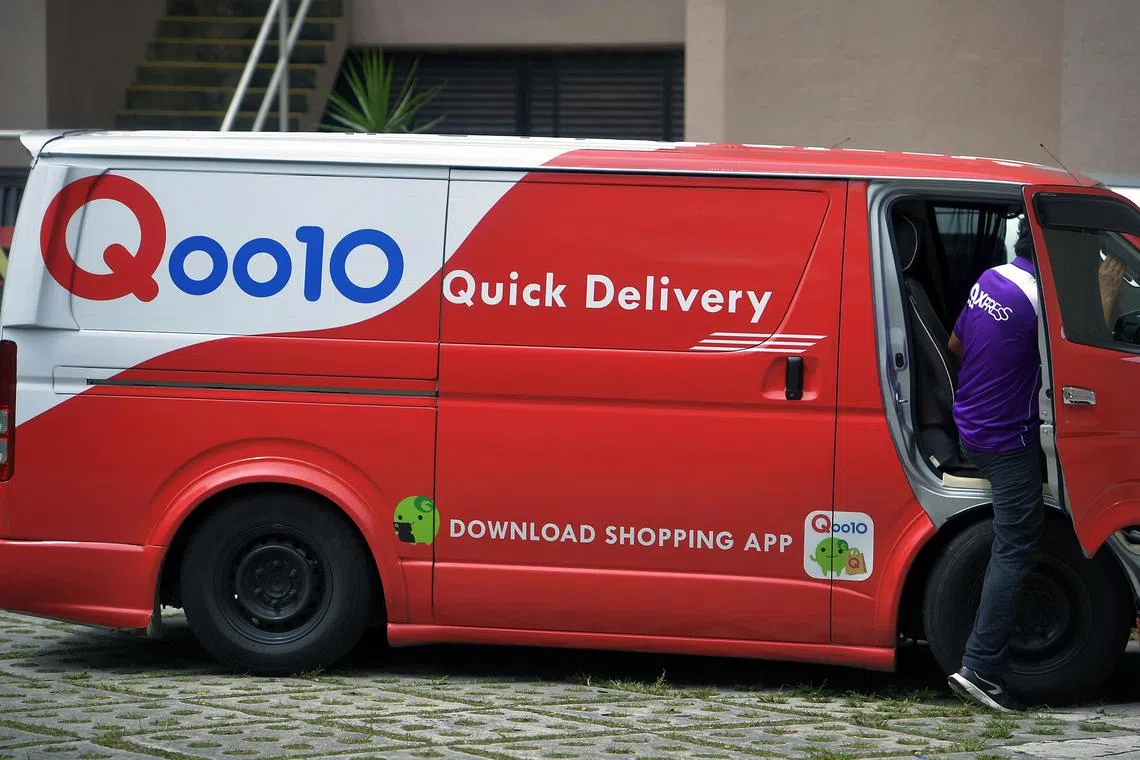askST: Qoo10 still owes me money. What can I do now that the e-commerce platform is winding up?
Sign up now: Get ST's newsletters delivered to your inbox

KCP claims Qoo10 refused to honour its guarantees to secure more than 70 billion won (S$66.6 million) in debt from its two e-commerce platform units.
PHOTO: ST FILE
SINGAPORE - The Singapore High Court ordered embattled e-commerce platform Qoo10 to be wound up on Nov 11
This comes after Korea Culture Promotion (KCP), which operates culture portal sites and issues culture gift certificates in South Korea, sought to wind up Qoo10 over nearly 76 billion won (S$72.4 million) in unpaid debt.
KCP also claims Qoo10 refused to honour its guarantees to secure more than 70 billion won in debt from its two e-commerce platform units, Tmon and WeMakePrice.
Six other creditors, including SCI Ecommerce, 21st Century Healthcare, Mister Mobile Trading and Shenzhen Lanmey Industries – which are together owed sums of $3.26 million and more than US$381,000 (S$510,000) – notified the court that they supported KCP’s winding-up application.
Small and medium-sized enterprises (SMEs) in Singapore selling on Qoo10 previously told The Straits Times
Q: What does Qoo10’s winding up mean for vendors and other creditors who did not file claims in court?
Creditors, whether big or small, who have not filed any claim in court against Qoo10 will no longer be able to do so.
But there remains an avenue for them to try to get some money back.
Mr Sean Chen, senior associate at Dentons Rodyk’s litigation and dispute resolution practice, said they can submit a document known as “proof of debt” to Qoo10’s liquidators, AAG Corporate Advisory. The document can be downloaded from the Ministry of Law’s website.
This document requires details such as the amount and description of the total debt that is apparently owed, as well as supporting documents, including invoices, receipts, contracts or messages.
“The liquidators will have to review these claims and make a decision whether to accept them or to reject them,” he said.
Mr Chen said that secured creditors, or those with legal rights over Qoo10’s assets such as vehicles, property, equipments or patents, can take steps to realise their security to pay down what is owed to them.
Other claimants, such as customers, will generally be treated as unsecured creditors.
Qoo10’s staff, who are not considered to be unsecured creditors, will be given higher priority by the liquidators and will be paid first.
“After the liquidators have paid out to the secured creditors and assuming that Qoo10 has sufficient assets, then the liquidators will have to pay all of the unsecured creditors’ claims,” he said.
If Qoo10 does not have sufficient assets to pay off all of the unsecured creditors’ claims, the liquidators will pay these unsecured creditors in accordance with the pari-passu rule (on equal footing, without preference).
“This means that the liquidators will have to treat all unsecured creditors equally and repay them an amount that is proportionate to their debt,” said Mr Chen.
Q. What about creditors who had earlier filed a complaint with other agencies, such as the Small Claims Tribunal?
Any pending cases, whether in the Small Claims Tribunal, as well as in the State Courts or High Court, will have to be paused or withdrawn.
Mr Chen added: “These creditors can submit their respective proof of debt to Qoo10’s liquidators for review and adjudication... If the liquidators accept their claims, then the creditors will be paid based on the same process.
“If the liquidators reject the creditors’ proof of debt, the creditors may decide whether to file an appeal against the liquidators’ decision.”
Mr Chen clarified that creditors who took Qoo10 to court will not receive repayments immediately just because they initiated the winding-up process.
He explained: “Once the company is bankrupted and liquidators are appointed, the liquidators will adjudicate all claims before making repayments to creditors simultaneously.”
This benefits smaller creditors, such as SME owners, he added.
“It’s costly to wind up a company... This way, smaller creditors won’t have to bear large expenses, even if Qoo10 owes them a relatively small amount.”
Q: What does the winding up mean for local versus foreign creditors? Most of the money mentioned in the High Court hearing are going to a South Korean firm.
Under Singapore law, no preferential treatment is given to creditors based on their nationality.
“This means that no matter whether you are a local or foreign creditor, the liquidators will have to distribute Qoo10’s assets based on Singapore’s insolvency law,” said Mr Chen.
Q: What role will the liquidators play?
Liquidators are court-appointed officers who act independently to manage a company’s assets.
Mr Chua Beng Chye, deputy head of the restructuring and insolvency practice at Rajah & Tann, said that duties of liquidators include recovering and selling assets, securing company records, reviewing debt claims, and investigating any potential misconduct by the company’s directors or officers.
“As part of their investigative function, they are empowered to summon and examine any officer or past officer of the company, the auditors, employees and anyone who they suspect to have possession of the company’s property,” he said.
Dentons Rodyk’s Mr Chen said that it is “not uncommon” for a creditor to request the court-appointed liquidators to look into the affairs of a wound-up company to uncover any wrongdoings that may have been committed by the company’s officers.
“If the court-appointed liquidators uncover that Qoo10’s officers’ mismanagement had caused Qoo10’s financial woes, then this may open up Qoo10’s officers to personal liability to all the creditors,” he said.
This means that liquidators could potentially go after the personal assets of Qoo10’s management, such as their bank savings, house or car.
“It is therefore in the public interest for the liquidators to thoroughly investigate Qoo10’s books.”
Correction note: This story has been edited for clarity.



